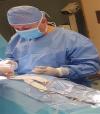What Does This MRI Report For Loss Of Hearing, Dizziness And Pressure In Head Indicate?

MRI two days ago showed, compared to one previous three months ago
a. There are, again, small hyperintense T2 foci within the white matter of both cerebral hemispheres, as well as mild increased T2 signal in the pens bilaterally.
b. Small areas of blooming artifact are, again, identified in the gradient sequence in keeping with axonal injury.
c. There is flow void within the vertebral, basilar, and carotid arteries.
d. Again, there are mild to moderate multilevel degenerative changes, which are most pronounced at C6-7.
e. At C6-7, there is a small broad-based posterior disc osteophyte with small to moderate bilateral uncovertebral osteophytes, slightly greater on the right with moderate bilateral foraminol narrowing, more so on the right.
I also have interesting data on vertebrae problems and infection problems, as described under medical history.
Herpesvirus encephalitis is a possibility.
Detailed Answer:
Hello and thanks for using HCM.
I have read your long query and understand your concerns.
As a Neurosurgeon I will try to help you by offering my neurosurgical point of view.
MRI findings are consistent with:
1. brain small artery disease
2. herpesvirus encephalitis ( if the main location of lesions are temporal lobes )
Head symptoms could be also related to balance nerves herpesvirus infection ( VIII-th cranial nerves ).
Freezing and numbness in face could be explained by cranial nerves infection by herpesvirus too.
Flow void on MRI is a normal finding when it comes to arteries.
That C7 fracture that was not consolidated could be at least partially responsible about neck and arms pain and/or numbness. It could herald instability of the cervical spine and could worsen degenative spine disease, so consolidation by surgery is the best option in this case.
Pain and numbness in groin and legs is most likely related to degenative and/or herniated disc disease of lumbar vertebral column and epidural or periradicular injections should help improve your symptoms.
Regarding to abscess, the basic medical principle is to evaluate its containings ( pus ) and to examine the material biologically about infection, after material examination results antibiotics are ordered.
To conclude, in my opinion, you should discuss with an ENT Doctor about abscess evaluation and further treatment, you should discuss with your primary care Doctor about getting tested for viral cerebral infection, and you should discuss with a Neurosurgeon about getting treated for C7 fracture treatment and possibility of epidural injections to improve symptoms.
After these measures, treatment should continue with physical therapy about degenative spine disease, and NSAID drugs.
Hope you found the answer helpful.
Best regards.

The increasing rate is my key concern. I feel that at this rate it will lead to blackout. Any suggestions for tests to rule out acute and dangerous process?
Aneurysm very unlikely.
Detailed Answer:
Welcome back.
MRI is among the best and credible imaging tools in diagnosis of cerebral diseases.
So, if there is an aneurysm, is very unlikely to not to be detected or suspected by MRI findings.
Besides probable cranial nerves viral infection, high blood pressure also can cause similar symptoms with yours, so checking blood pressure is advisable too.
Hope I helped you. Best regards.

One data point: when I told them the interior of my right eye feels frozen, they checked the pressure and said fine. However, when tthey checked just vision, my right eyesight was much worse than left. I went three smaller sizes of letters with left eye. This difference has never been there before, and is happening at the same time this freezing and numbness is so much worse. Does this suggest anything to you?
Again it is not the symptoms as much as the rate of increase in pace that concerns me most. If it could still be HSE, or another possibility, what warning signs should I look for?
DOES
Viral infection is not assessed properly by routine blood tests.
Detailed Answer:
Hi again.
Viral infections especially those thought to affect nervous system are not detected or diagnosed only by routine blood tests.
There's is need in some cases for specialized immunological tests to determine the diagnosis.
About lowering of sight by one eye, first there's need for an Oftalmologist evaluation to decide whether the problem is related to eye apparatus, or is related to nervous system (brain and nerves).
If the problem is found to arise by nervous system, again, tests needed to evaluate eg. optic neuritis or inflamation of optic nerve that may be related to autoimmune diseases as well as viral infection.
About increased pace of symptoms, one explanation could be anxiety disorder related to them.
So far, there's no any evidence to support brain aneurysm.
Get further testing.
Hope I've been of help.
Best regards.

Nasal drip probably due to sinusitis
Detailed Answer:
Hello again.
Nasal drip accompanied by strange taste sensations could be related to sinusitis, or infection of paranasal sinuses.
It is important to know the situation of sinuses evaluated by last MRI, were there any findings or reports that can explain this possibility?
Another possibility of nasal drip can be liquorhea or cerebrospinal fluid leak related to fracture or damage to base of the skull bones. This possibility is more probable if the drip is clear and tastes salty.
Best imaging tool to evaluate bones and defects of skull base is CT scan with thin cuts.
All these possibilities should be discussed with a Neurosurgeon.
Hope this helps.
If you have more information about imaging studies related to base of skull findings, feel free to share.
Take care.
Answered by

Get personalised answers from verified doctor in minutes across 80+ specialties



